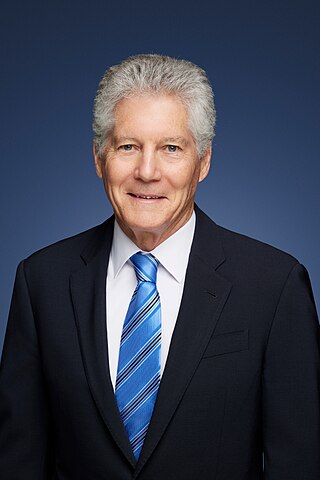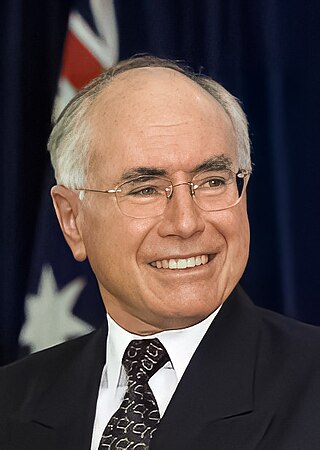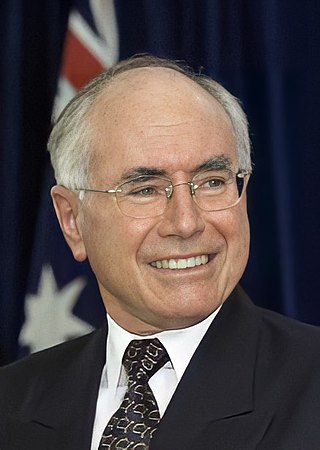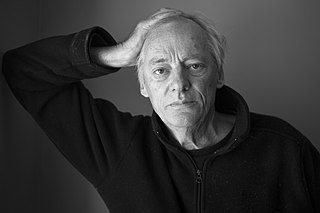
Robert James Lee Hawke was an Australian politician and trade unionist who served as the 23rd prime minister of Australia from 1983 to 1991. He held office as the leader of the Australian Labor Party (ALP), having previously served as the president of the Australian Council of Trade Unions from 1969 to 1980 and president of the Labor Party national executive from 1973 to 1978.

Paul John Keating is an Australian former politician who served as the 24th prime minister of Australia from 1991 to 1996, holding office as the leader of the Labor Party (ALP). He previously served as treasurer under Prime Minister Bob Hawke from 1983 to 1991 and as the seventh deputy prime minister from 1990 to 1991.
Paul John Kelly is an Australian political journalist, author and television and radio commentator from Sydney. He has worked in a variety of roles, principally for The Australian newspaper and is currently its editor-at-large. Kelly also appears as a commentator on Sky News Australia and has written seven books on political events in Australia since the 1970s including on the 1975 Australian constitutional crisis. Recent works include The March of Patriots, which chronicles the creation of a modern Australia during the 1991–2007 era of prime ministers, Paul Keating and John Howard, and Triumph & Demise which focuses on the leadership tensions at the heart of the Rudd-Gillard Labor governments of 2007 to 2011. Kelly presented the Australian Broadcasting Corporation (ABC) TV documentary series 100 Years – The Australian Story (2001) and wrote a book of the same title.

Parliament House, also known as Capital Hill, is the meeting place of the Parliament of Australia, the legislative body of Australia's federal system of government. The building also houses the core of the executive, containing the Cabinet room and offices of the Prime Minister and other federal ministers.

Stephen Francis Smith is an Australian former politician and diplomat serving as the 26th and current high commissioner of Australia to the United Kingdom since 2023. A member of the Australian Labor Party (ALP), he was the federal member of Parliament (MP) for the division of Perth from 1993 to 2013, serving in the Rudd and Gillard governments as minister for Foreign Affairs from 2007 to 2010, minister for Trade in 2010 and minister for Defence from 2010 to 2013.
Michael Gawenda is an Australian journalist and was editor of The Age from 1997 to 2004. He was appointed inaugural Director of the Centre for Advanced Journalism at the University of Melbourne, launched in 2008. The centre's mission is to improve the practice of journalism through dialogue between journalists and the general community to stimulate public debate on important issues facing journalism.
Andrew Charles Theophanous is a Cypriot-born Australian former politician. He was an Australian Labor Party member of the House of Representatives from 1980 to 2000, and an independent member from 2000 to 2001. He is the author of three books and numerous articles on political theory and philosophy, especially in the areas of multiculturalism and social justice.
Don Watson is an Australian author, screenwriter, former political adviser, and speechwriter.

John Winston Howard is an Australian former politician who served as the 25th prime minister of Australia from 1996 to 2007. He held office as leader of the Liberal Party of Australia, his eleven-year tenure as prime minister is the second-longest in Australian history, behind only Sir Robert Menzies. Howard has also been the oldest living Australian former prime minister since the death of Bob Hawke in May 2019.

The Redfern Park Speech, also known as the Redfern speech or Redfern address, was made on 10 December 1992 by the then Australian Prime Minister, Paul Keating, at Redfern Park, which is in Redfern, New South Wales, an inner city suburb of Sydney. The speech dealt with the challenges faced by Indigenous Australians, both Aboriginal Australian and Torres Strait Islander peoples. It is still remembered as one of the most powerful speeches in Australian history, both for its rhetorical eloquence and for its ground-breaking admission of the negative impact of white settlement in Australia on its Indigenous peoples, culture and society, in the first acknowledgement by the Australian Government of the dispossession of its First Peoples. It has been described as "a defining moment in the nation's reconciliation with its Aboriginal and Torres Strait Islander people".

Keating! is a sung-through musical which portrays the political career of former Australian Prime Minister Paul Keating. Keating was Prime Minister between 1991 and 1996; the musical follows him from his ascent to the leadership through to his eventual electoral defeat by John Howard. It was written by Casey Bennetto, who was inspired to write the show by his disappointment at the results of the 2004 federal election, which saw Howard's Coalition government returned for a fourth term. The musical takes a humorous, satirical tone and presents a positive image of Keating while frequently criticising the Howard government. Bennetto describes the show as "ridiculously pro-Paul Keating".
The National Biography Award, established in Australia in 1996, is awarded for the best published work of biographical or autobiographical writing by an Australian. It aims "to encourage the highest standards of writing biography and autobiography and to promote public interest in those genres". It was initially awarded every two years, but from 2002 it has been awarded annually. Its administration was taken over by the State Library of New South Wales in 1998.
George Megalogenis is an Australian journalist, political commentator and author.

The Howard government refers to the federal executive government of Australia led by Prime Minister John Howard between 11 March 1996 and 3 December 2007. It was made up of members of the Liberal–National Coalition, which won a majority of seats in the House of Representatives at four successive elections. The Howard government commenced following victory over the Keating government at the 1996 federal election. It concluded with its defeat at the 2007 federal election by the Australian Labor Party, whose leader Kevin Rudd then formed the first Rudd government. It was the second-longest government under a single prime minister, with the longest having been the second Menzies government (1949–1966).

Several surveys of academics and the general public have been conducted to evaluate and rank the performance of the prime ministers of Australia.
The Colin Roderick Award is presented annually by the Foundation for Australian Literary Studies at Queensland's James Cook University for "the best book published in Australia which deals with any aspect of Australian life". It was first presented in 1967 and now has a prize of A$50,000. Starting in 1980, the H. T. Priestley Memorial Medal has also been bestowed upon the award winner.

The Keating government was the federal executive government of Australia led by Prime Minister Paul Keating of the Australian Labor Party from 1991 to 1996. The government followed on from the Hawke government after Paul Keating replaced Bob Hawke as Labor leader in an internal party leadership challenge in 1991. Together, these two governments are often collectively described as the Hawke-Keating government. The Keating government was defeated in the 1996 federal election and was succeeded by John Howard's Coalition government.

The Prime Minister's Office (PMO), also known as the Office of the Prime Minister, is the personal office of the Prime Minister of Australia that provides political advice and executive support to the Prime Minister. The PMO is led by the Prime Minister's Chief of Staff and or Principal Private Secretary and is composed of ministerial advisers assisting with party politics, media relations, and political strategy. Scholars including Professor Anne Tiernan of Griffith University and Professor James Walter of Monash University have observed the centralisation and expansion of power within the PMO over the past three decades.

Andrew Chapman OAM, is an Australian photojournalist.












